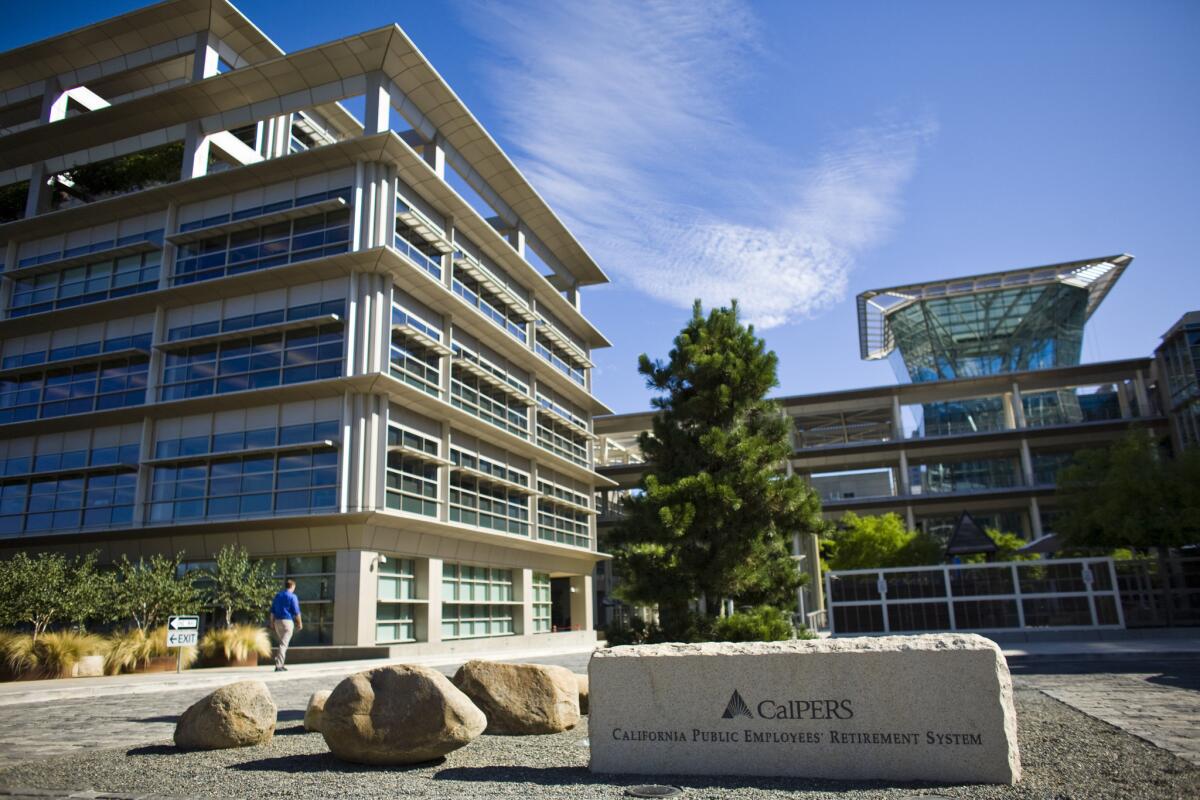CalPERS calls on Exxon and Chevron to disclose financial risks of climate change

As of June 30, CalPERS owned 12.7 million Exxon Mobil shares valued at more than $1 billion and 8.3 million Chevron shares valued at more than $800 million. Above, CalPERS offices in Sacramento.
- Share via
The California Public Employees’ Retirement System is joining a growing number of investors calling on Exxon Mobil Corp. and others to disclose the financial risks of climate change and climate change policies.
Shareholders of Exxon Mobil, Chevron Corp. and seven other energy companies will soon gather for annual meetings where votes will be cast on climate risk disclosure. The proposals ask the companies to evaluate and disclose the potential financial fallout of recent international commitments to hold the planet’s rise in average temperatures below 2 degrees Celsius.
This limit was set at last year’s climate summit in Paris, where almost 200 nations committed to slowing warming of the Earth’s atmosphere.
NEWSLETTER: Get the day’s top headlines from Times Editor Davan Maharaj >>
CalPERS and 31 investors, including New York City’s pension funds and BNP Paribas Investment Partners, want to know how much of the companies’ petroleum reserves must stay in the ground to meet greenhouse gas emission limits.
“The world is a different place, and you can’t manage what you can’t measure,” said Anne Simpson, a CalPERS investment director.
Since 1990, Exxon Mobil’s executives have repeatedly opposed similar campaigns by activist shareholders. But with heightened interest following the Paris agreement, this year’s vote could reveal a shift in investors’ mood, analysts said.
“This is part of a broader call by investors for disclosure on how companies are going to adapt to a 2-degree future,” said Shanna Cleveland, a senior manager at Ceres, a nonprofit working with business people on climate issues. “CalPERS has really stepped in to play a leadership role … working to get the message out to other major shareholders.”
The response from Exxon Mobil directors to the shareholder proposals will be included in the proxy statement distributed Wednesday, said Alan Jeffers, a spokesman for the Irving, Texas, company.
“Addressing climate change, providing economic opportunity and lifting billions out of poverty are complex and interrelated issues requiring complex solutions,” Jeffers said. “There is a consensus that comprehensive strategies are needed to respond to these risks.”
Chevron’s board recommended that shareholders vote against the proposal, arguing in the proxy statement that “setting unilateral, long-term [greenhouse gas] emissions targets tied to global emissions reduction trajectories is not prudent” because it would put the San Ramon, Calif., company at a competitive disadvantage.
As of June 30, CalPERS owned 12.7 million Exxon Mobil shares valued at more than $1 billion and 8.3 million Chevron shares valued at more than $800 million.
Exxon Mobil and Chevron have long maintained that global economic growth in the coming decades will exhaust their existing oil and gas reserves. The companies’ share price depends, in part, on the potential future earnings from those fossil fuel reserves.
Asaf Shalev is a reporter with Columbia University’s Energy & Environmental Reporting Project.
ALSO
Tijuana River blockage floods Imperial Beach streets, kills 50 leopard sharks
Retail sales fall in March as Americans cut back on buying cars
Los Angeles poised to adopt environmental protections for polluted communities
More to Read
Inside the business of entertainment
The Wide Shot brings you news, analysis and insights on everything from streaming wars to production — and what it all means for the future.
You may occasionally receive promotional content from the Los Angeles Times.










